Thoughts and Notes on `Will AI Replace Us?' (Fan 2019)
Thoughts and Notes on `Will AI Replace Us?' (Fan 2019)by JT Velikovsky
Will A.I. replace us humanimals? ...I certainly hope so. Look how cool these robots are.
10 Incredible Robots That Actually Exist (Youtube 2018)
Meantime, Shelly Fan (2019) has written a great little book called...
Will AI Replace Us? A primer for the 21st century.
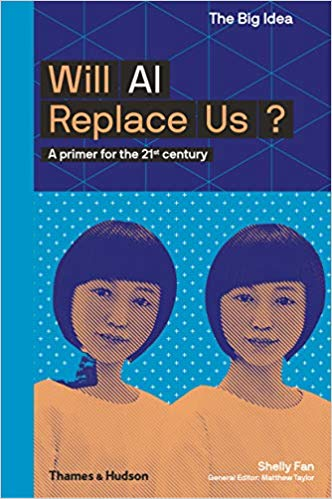 Fan, S. (2019). Will AI replace us? A primer for the 21st century. London, Thames & Hudson Ltd.
Fan, S. (2019). Will AI replace us? A primer for the 21st century. London, Thames & Hudson Ltd.
Here is the Abstract of the book:
--------------
Below are some Notes I took while reading it, and also some Comments and Discussion Points for my students.
But first I'd recommend reading all 3 books by Yuval Noah Harari, also Life 3.0 by Max Tegmark, and Superintelligence by Nick Bostrom.
A quote from (Fan 2019) that I liked:
Take a look at this (2007) paper, which has 70 definitions, gathered from here, there, & everywhere:
Maybe it's just: problem-solving ability.
All of this reminds me of, the (similar) problem in defining "culture".
See my (2016) PhD Appendix (book chapter), where I wrote:
On page 10, Fan (2019) rightly notes that AI was misused when the jerks at Cambridge Analytica targeted some swinging voters (who also aren't very good critical thinkers, I might add) and caused: Trump, and Brexit... (What a nightmare. This is the dark side of AI. When you get jerks using it, for jerky purposes. Anyway - see this documentary below, for the whole debacle... Below is: the Trailer.)
The Great Hack (Netflix 2019)
Moral: Don't let evil jerks use AI, or they can ruin the world for everyone. Like they have, with Trump and Brexit. Both of which were - and still are - terrible ideas... Read Harari's great book 21 Lessons (2018) to see why... I don't have time to get into it all here. Also we need robo-politicians (cyber-democracy). Mainly as humanimals aren't capable enough to run the world any more, it's all gotten too complex for human brains...
But anyway - back to Fan (2019).
On page 11, it notes, since 2018, Baidu (2nd largest search engine in the world, after Google) has voice-mimicing tech (`voice-cloning AI') that can simulate a human voice, by only listening to a minute of spoken text...! And, of course, Google has Duplex.
Google Duplex: A.I. Assistant Calls Local Businesses To Make Appointments (YouTube 2018)
For more, see this VICE article on Deep Voice (Cole 2018). (...In fact, it only needs 3.7 seconds of audio! But with 100 samples, it's: pretty good.) If you want to go deeper, there's an arXiv article (2018) on Baidu's Deep Voice software, here.
Fan (2019, p. 11) also notes the problem of: deepfake porn. (Then again - maybe if robots take porn-performers' jobs, it's a good thing? Ethically, I mean.)
Also - this is basic stuff, ("AI-101") but worth pointing out - the definition of "brute force" in AI.
Page 12 also talks about IBM's Watson winning Jeopardy back in 2011...
IBM's Watson wins Jeopardy
And, AlphaGo beating the world Go champ (Lee Sedol) in 2016. (See the great doco, below.)
AlphaGo documentary (Trailer)
Pages 14 and 15 of Fan (2019) mention: the One Hundred Year Study on Artificial Intelligence (AI100) Stanford University (2015). There is another report coming in the year 2020 (next year).
As for the history of AI, (Fan 2019, p. 18) rightly notes, the study of AI is customarily dated to the Dartmouth workshop in 1956, organized by Maths professor, John McCarthy.
Page 19 mentions how Aristotle invented syllogistic logic , which is basically an algorithm.
Namely, something like: "Major premise: All M are P. Minor premise: All S are M. Conclusion: All S are P." (Set Theory.)
P 19 also has a definition of algorithm: (I love collecting definitions of "algorithm" :)
An excerpt:
Page 23 talks about Alan Turing, and also Bernoulli Numbers...
Page 24 talks about Turing's essay Computing Machinery and Intelligence (1950), which asks "Can machines think?". And, from whence comes, the Turing Test...
P 27 mentions toy problems.
P 29 mentions OpenAI, founded in 2015 by Elon Musk and Sam Altman.
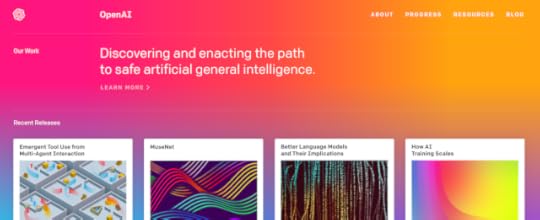
P 34 has a good definition of GOFAI:
(If you try a search, try searching on "tree" or "cat" for a start.)
Another good quote:
Intro to Deep Learning 2018 - Lesson 1 (Youtube 2018)
Page 42 of Fan (2019) has a terrific chart:
`A mostly complete chart of neural networks by Fjodor Van Veen' (Fan 2019, p. 42)
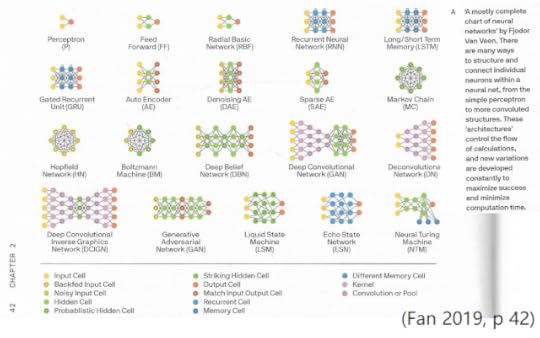
Also this is cool: a GAAE (on Fan 2019, p. 58).
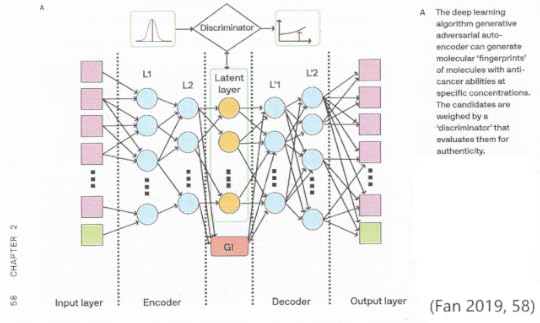
And another great quote from Fan is on pp 44-5:
And, here is something interesting:
In regard to self-driving vehicles, Fan (2019) mentions "the support vector machine, a popular algorithm inspired by human psychology. The exotically named algorithm relies on a simple principle: that humans learn by analogies." (p. 50)
PP 52-3 mentions reinforcement learning... "a type of trial and error often used to train animals. In short, an action either receives a reward or a penalty, and the animal gradually changes its behavior to the desired outcome. For animals, the reward is often food. In AI, the reward is a number that the algorithm is trying to maximize. During learning, the reward can either be short term, given immediately following an action, or long term, only given after an entire action sequence." (pp. 52-3)
Another cool quote:
Hey - so here's Google's DeepMind using Deep-Q Learning, optimizing a player strategy for Atari Breakout:
Google DeepMind's Deep Q-learning playing Atari Breakout (Youtube 2015)
Also, I liked this definition of working memory:
A good definition of Big Data:
Think of all the books he read, and information he absorbed.
No wonder he cracked: evolution.
Hey - here's a mind-blowing read: (seriously)
Exploration and Exploitation of Victorian Science in Darwin’s Reading Notebooks (2017) byJaimie Murdock a,b, Colin Allen a,c,d, Simon DeDeo a,b,e,f,∗
Page 58 of Fan (2019) talks about evolutionary algorithms...
I found this interesting:
Lithium-Ion Batteries: A Machine-Generated Summary of Current Research (Beta Writer 2019)

Page 59 of Fan (2019) also talks about: Suki.

Reeti (Youtube 2011)
Pp 66-7 talks about Tay, Microsoft's (2016) Twitter chatbot which went off the rails and became sexist and racist (and generally: offensive) within a day, due to internet trolls gaming its system. The Moral: GIGO (Garbage In, Garbage Out).
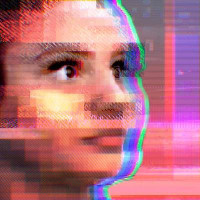 Microsoft's Tay (acronym for: Thinking About You) (2016).
Microsoft's Tay (acronym for: Thinking About You) (2016).
Page 66 talks about gender and racial bias in AI, due to programming flaws and problems of human nature.
P68 talks about the US Navy's SAFFiR. As a former firefighter: I like it! Send in the firefighting bots.
SAFFiR - Shipboard Autonomous Firefighting Robot (Youtube 2015)
Another cool quote:
P 76 talks about some problems in AI, such as Google Photos' (2015) GorillaGate, and racial bias in COMPAS.
p 80 talks about ethical AI, and The IEEE Global Initiative for Ethical Considerations in Artificial Intelligence and Autonomous Systems [Standards] (2017).
P 82 talks about China's social credit system... The gamification of society! (And why not.)
Another cool quote:
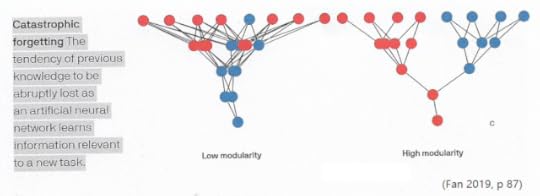
Basically, you can turn the modules on or off, so they don't get overwritten.
And, overall, according to Fan (2019) here's the bottom line:
See also my review of Novacene (Lovelock 2019).
P 94 of Fan (2019) talks about the (2017) SoftBank "robo-coffee-shops" in Japan...
Robots Pepper and duAro to work in NESCAFE Coffee Shop in Japan (Youtube 2017)
Side Note: Q: How Many "Peppers" have stolen human jobs, anyway? A: See, this article (August 2019). It says: "About 15,000 Peppers are deployed in Japanese and European banks, fast service restaurants and healthcare settings."
An ad for Pepper the robot (Youtube 2017)
Hey - randomly - this one (Sophia) is a bit creepy: (uncanny valley problems)
We Talked To Sophia — The AI Robot That Once Said It Would 'Destroy Humans' (Youtube 2017)
And here are some supercool robots - (e.g.: Spot-mini, BigDog, Handle, WildCat, Sand Flea, Atlas the Dynamic Humanoid, etc):
Boston Dynamics robots (Youtube 2017)
As for robots taking jobs (and replacing humanimals), here's also a good quote:
Bring on: Universal Basic Income.
And let the robots do all the work.
(Who needs: work? Work is for losers. And, robots.)
See: In Praise of Idleness (Bertrand Russell 1934).
Page 100 of Fan (2019) talks about Universal Basic Income...
Rutger Bregman on Universal Basic Income (Youtube 2017)
Here's another supercool quote:
P 106 talks about neuromorphic chips...
Another good definition:
Yet another good definition:
See Harari on "The Rise of the Useless Class"...!
Harari on his book Homo Deus (Youtube 2016)
Here's a quote from Fan (2019) that I love:
P 124 talks about the legal document generator, ROSS.
Pp. 124-5 talks about Word Lens:
Word Lens (Youtube 2010). Note: "Word Lens has now been integrated to the Google Translate app, and is not available anymore as a standalone app."
P 125 talks about the automated news writing system, RADAR.
Here's another great quote:
It is the job of science fiction to: imagine the future, and show possible scenarios. Good and bad.
I am not talking about just some sci fi (the dystopian stuff), but consider all science fiction.
It did actually predict: "some of the negative personal and social outcomes of its use, such as invasion of our privacy, social media addiction and the prevalence of fake news"... !See, stuff like Neuromancer, Snow Crash, Brave New World, and so many more...
(See: lots of sci-fi short stories about all that stuff...)...Just sayin :)
Check out everything on Youtube, by Yuval Noah Harari. And, read his (GREAT!) 3 books...
Watch this, from: 35 mins 15 secs, onwards (Yuval Noah Harari on: science fiction)
See also: The Robo-Raconteur (2018)
Anyway - this is a pretty great book, so, buy and read it:
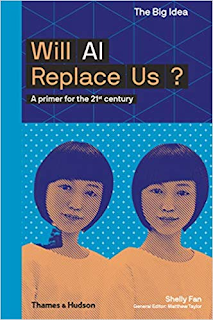
(Cool list! I've read about half of 'em...)

Anyway - so I very highly recommend (Fan 2019).
Buy and read it!
Hey you know what's big news?
In 2018, AI entered: the DPFi sociocultural systems model of creativity...
(After 30 years of not being there!)
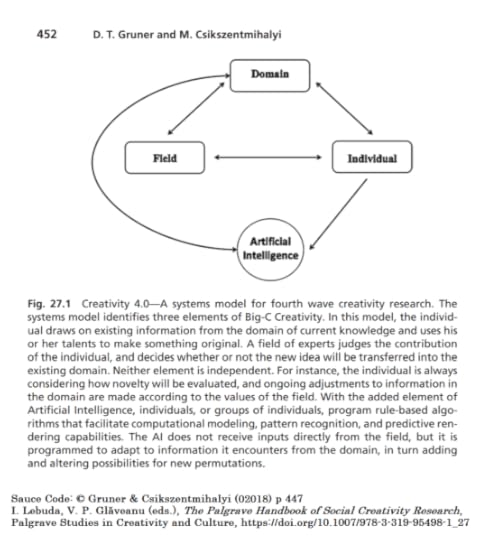
See: Creativity 4.0 Diagram!
Thanks for reading. And, watching.
-----------------------------
You have been reading a blog-post by:
Dr J T Velikovsky
AI Researcher & Enthusiast& Evolutionary Culturologist
(and, also The StoryAlity Guy) aka Humanimal Transmedia Blog: On Writering
IMDb (Movies, Videogames): Music: Texas Radio & Zen Stupidity& Films about Bathurst...
etc etc. See On Writering and StoryAlity News .
---------//----------
Will A.I. replace us humanimals? ...I certainly hope so. Look how cool these robots are.
10 Incredible Robots That Actually Exist (Youtube 2018)
Meantime, Shelly Fan (2019) has written a great little book called...
Will AI Replace Us? A primer for the 21st century.
 Fan, S. (2019). Will AI replace us? A primer for the 21st century. London, Thames & Hudson Ltd.
Fan, S. (2019). Will AI replace us? A primer for the 21st century. London, Thames & Hudson Ltd.Here is the Abstract of the book:
`The past sixty years have witnessed astonishing bursts of growth in the field of Artificial Intelligence - the science and computational technologies that teach machines to sense, learn, reason and take action. AI is already changing our lives, in ways that benefit health, productivity and entertainment. Are we on the threshold of an AI-dominated world, in which humans will no longer be necessary?' (Fan 2019)My review?I like it. It's a good review of the current issues, topics and trends facing us, regarding AI.In a nutshell, buy it and read it.
--------------
Below are some Notes I took while reading it, and also some Comments and Discussion Points for my students.
But first I'd recommend reading all 3 books by Yuval Noah Harari, also Life 3.0 by Max Tegmark, and Superintelligence by Nick Bostrom.
A quote from (Fan 2019) that I liked:
`AI is the most human of technologies. It began with the idea of creating machines that imitated humans. It developed by copying human thought processes and by learning from and extracting from human brains.' (Fan 2019, p. 8)Which is all fair enough...?This one below is also funny (because it's true):
`An inside joke is that once a machine can do something previously only achieved by humans, then the task is no longer considered a sign of intelligence.' (p. 9)...What is intelligence, after all? The definition of intelligence is currently an unsolved problem as there's not a consensus. Depends who you ask (and, in which domain in culture), and what they're examining.
Take a look at this (2007) paper, which has 70 definitions, gathered from here, there, & everywhere:
Legg & Hutter (2007). `A Collection of Definitions of Intelligence'. Frontiers in Artificial Intelligence and Applications, Vol. 157 (2007) pp. 17-24Abstract:
`This paper is a survey of a large number of informal definitions of "intelligence'' that the authors have collected over the years. Naturally, compiling a complete list would be impossible as many definitions of intelligence are buried deep inside articles and books. Nevertheless, the 70-odd definitions presented here are, to the authors' knowledge, the largest and most well referenced collection there is.'Short story: There is `g factor' or general intelligence (as tested in: IQ tests), but also, Gardner's multiple intelligences...
Maybe it's just: problem-solving ability.
All of this reminds me of, the (similar) problem in defining "culture".
See my (2016) PhD Appendix (book chapter), where I wrote:
`INTRODUCTION
This chapter proposes a formal structure for the unit of culture, also known as the meme (Dawkins, 1976), namely: the holon/parton (Velikovsky, 2013b), synthesizing concepts from (Koestler 1967) and Feynman (2005).
Previously, an unsolved problem across media, the arts, entertainment and science has been defining ‘the unit of culture’, resulting in over three hundred varying definitions of culture (Baldwin et al 2006), and no consensus (van Peer et al 2007).'
(Velikovsky 2016, p. 208)Anyway, so - defining "intelligence" is all a bit fuzzy... I had another article where I just used Garlick (2010)'s definition of intelligence, which is simply: understanding. (see Velikovsky 2014, p. 3).
VELIKOVSKY, J. T. Flow Theory, Evolution & Creativity: or, 'Fun & Games'. Interactive Entertainment 2014 (IE2014) Conference, 2014 Newcastle, Australia. ACM.Abstract:
`In this paper videogames and transmedia are examined from the perspectives of both creation (game design) and audience reception (gameplay experience), in light of the theories of the DPFi (Domain, Person Field interaction) systems model of creativity (Csikszentmihalyi 1988, 1996, 2006, 2014); its herein contended theoretical equivalent, evolutionary epistemology (Popper 1963, DT Campbell 1974, Simonton 2010) and the inherent biocultural evolutionary creative algorithm of selection, variation and transmission-with-heredity; 'flow' theory in creativity (Csikszentmihalyi 1975, 1990, 1996) as a determinant of 'fun factor' in games; 'narrative transportation' theory in fiction (Gerrig 1993, Green & Brock 2000, Van Laer et al 2014) as an additional (necessary but not sufficient) determinant of 'fun-factor' in 'story' videogames; and Boyd's (2009) general theory of creativity in the arts as 'cognitive play with pattern' - ultimately arguing that game play of any kind may potentially enhance animal intelligence, and therefore that videogames as an art form may potentially enhance human intelligence.'Anyway, but back to Fan (2019).
On page 10, Fan (2019) rightly notes that AI was misused when the jerks at Cambridge Analytica targeted some swinging voters (who also aren't very good critical thinkers, I might add) and caused: Trump, and Brexit... (What a nightmare. This is the dark side of AI. When you get jerks using it, for jerky purposes. Anyway - see this documentary below, for the whole debacle... Below is: the Trailer.)
The Great Hack (Netflix 2019)
Moral: Don't let evil jerks use AI, or they can ruin the world for everyone. Like they have, with Trump and Brexit. Both of which were - and still are - terrible ideas... Read Harari's great book 21 Lessons (2018) to see why... I don't have time to get into it all here. Also we need robo-politicians (cyber-democracy). Mainly as humanimals aren't capable enough to run the world any more, it's all gotten too complex for human brains...
But anyway - back to Fan (2019).
On page 11, it notes, since 2018, Baidu (2nd largest search engine in the world, after Google) has voice-mimicing tech (`voice-cloning AI') that can simulate a human voice, by only listening to a minute of spoken text...! And, of course, Google has Duplex.
Google Duplex: A.I. Assistant Calls Local Businesses To Make Appointments (YouTube 2018)
For more, see this VICE article on Deep Voice (Cole 2018). (...In fact, it only needs 3.7 seconds of audio! But with 100 samples, it's: pretty good.) If you want to go deeper, there's an arXiv article (2018) on Baidu's Deep Voice software, here.
Fan (2019, p. 11) also notes the problem of: deepfake porn. (Then again - maybe if robots take porn-performers' jobs, it's a good thing? Ethically, I mean.)
Also - this is basic stuff, ("AI-101") but worth pointing out - the definition of "brute force" in AI.
`Brute force - A general problem-solving technique. It systematically enumerates possible solutions to a problem and checks every single candidate solution before reaching a result.' (Fan 2019, p. 13)This is what most creative humans do... Namely, they think of about 100 ideas (solutions to a problem), and one of them will be: great! (BVSR. Blind Variation and Selective Retention.)
Page 12 also talks about IBM's Watson winning Jeopardy back in 2011...
IBM's Watson wins Jeopardy
And, AlphaGo beating the world Go champ (Lee Sedol) in 2016. (See the great doco, below.)
AlphaGo documentary (Trailer)
Pages 14 and 15 of Fan (2019) mention: the One Hundred Year Study on Artificial Intelligence (AI100) Stanford University (2015). There is another report coming in the year 2020 (next year).
As for the history of AI, (Fan 2019, p. 18) rightly notes, the study of AI is customarily dated to the Dartmouth workshop in 1956, organized by Maths professor, John McCarthy.
Page 19 mentions how Aristotle invented syllogistic logic , which is basically an algorithm.
Namely, something like: "Major premise: All M are P. Minor premise: All S are M. Conclusion: All S are P." (Set Theory.)
P 19 also has a definition of algorithm: (I love collecting definitions of "algorithm" :)
`Algorithm: In computer science, algorithms are unambiguous sets of instructions or rules that define a process to guide calculations and other problem-solving operations.' (Fan 2019, p. 19)P 20 mentions Descartes, also Hobbes' Leviathan (1651), and Leibniz' (1666) alphabet of ideas...
`In Leviathan (1651), Hobbes famously argues for a mechanical, combinatorial way of thinking, much like the way machines combine different modules to further gain functionality.' (Fan 2019, p 20)Basically, this refers to part`V - Of Reason and Science' of Hobbes' Leviathan (1651).
An excerpt:
`In sum, in what matter soever there is place for addition and subtraction, there also is place for reason; and where these have no place, there reason has nothing at all to do. Out of all which we may define (that is to say determine) what that is which is meant by this word reason when we reckon it amongst the faculties of the mind. For reason, in this sense, is nothing but reckoning (that is, adding and subtracting) of the consequences of general names agreed upon for the marking and signifying of our thoughts; I say marking them, when we reckon by ourselves; and signifying, when we demonstrate or approve our reckonings to other men.' (Hobbes 1651, p. 26)Page 21 on (Fan 2019) talks about An essay towards solving a problem in the doctrine of chances (Bayes 1763). Bayes' Theorem is widely used today in Computer Science. (Unfortunately, seems most people don't update their knowledge based on new information, mainly due to: cognitive biases.)
Page 23 talks about Alan Turing, and also Bernoulli Numbers...
Page 24 talks about Turing's essay Computing Machinery and Intelligence (1950), which asks "Can machines think?". And, from whence comes, the Turing Test...
P 27 mentions toy problems.
P 29 mentions OpenAI, founded in 2015 by Elon Musk and Sam Altman.

`OpenAI’s mission is to ensure that artificial general intelligence benefits all of humanity. We’re a team of a hundred people based in San Francisco, California. The OpenAI Charter describes the principles that guide us as we execute on our mission.' (OpenAI.com, 2019, online)Here also is a good definition of Backpropagation: (see also the "Talks at Google" Youtube video below, by Pedro Domingos, 2015)
Backpropagation: A mathematical method of assigning error to every artificial neuron within an artificial neuronal network. It serves to change the network towards the correct response and to minimize error. (Fan 2019, p. 31)Page 32 notes the two major AI "winters" were in 1974-80, and in 1987-93. Mainly due to hardware issues and funding problems.
P 34 has a good definition of GOFAI:
GOFAI: An umbrella term for AI algorithms that rely on manipulating symbols and rules. This approach arguably reached its limit with expert systems. (Fan 2019, p. 34)P 36 mentions the release of ImageNet by Stanford University in 2009... Interesting.
(If you try a search, try searching on "tree" or "cat" for a start.)
Another good quote:
`Today, a paradigm shift towards AI - as a tool to solve problems, rather than as a way to build intelligent minds - is proving a major driving force for related industries to contribute large monetary sums to edge ahead in the AI race.' (Fan 2019, p. 37)Also, a good definition of machine learning:
Often mentioned as a single discipline, machine learning is in fact an umbrella term for a group of diverse statistical strategies that aim to solve specific problems. (Fan 2019, p. 42)[Students take note] - Here is Lesson 1 of How to Train a Neural Net
Intro to Deep Learning 2018 - Lesson 1 (Youtube 2018)
Page 42 of Fan (2019) has a terrific chart:
`A mostly complete chart of neural networks by Fjodor Van Veen' (Fan 2019, p. 42)

Also this is cool: a GAAE (on Fan 2019, p. 58).

And another great quote from Fan is on pp 44-5:
The other commonplace AI application is personal recommenders. As an example, consider four seemingly diverse companies: Netflix, the movie-streaming service; Amazon, the online shopping platform; Facebook, the social media network; and Google, the search engine. Although these companies provide different services, fundamentally their AI systems are performing a very similar task: they are gatekeepers to information. (Fan 2019, pp. 44-5)As Harari notes, Amazon actually recommends better books of interest than a human ever could...
And, here is something interesting:
Leveraging its mass database of user viewing habits, the company predicted the plots and actors that attract the most attention, and began to produce movies and television shows based on these data. Thus far, Netflix has released several hits, including House of Cards, Orange is the New Black and Stranger Things, and its approach has been adopted by other online streaming services such as Amazon Prime Video and Hulu. (Fan 2019, p. 47, bold emphasis mine)This all reminds me of my (2016) PhD on High-RoI Movies... (see the very first page of it!)
In regard to self-driving vehicles, Fan (2019) mentions "the support vector machine, a popular algorithm inspired by human psychology. The exotically named algorithm relies on a simple principle: that humans learn by analogies." (p. 50)
PP 52-3 mentions reinforcement learning... "a type of trial and error often used to train animals. In short, an action either receives a reward or a penalty, and the animal gradually changes its behavior to the desired outcome. For animals, the reward is often food. In AI, the reward is a number that the algorithm is trying to maximize. During learning, the reward can either be short term, given immediately following an action, or long term, only given after an entire action sequence." (pp. 52-3)
Another cool quote:
Another algorithm inspired by the brain, the differentiable neural computer (DNC), loosely mimics working memory, which lets the DNC `reason' about multi-step problems. (p. 54)And also talks about Deep Q Networks (DQN), "which can repeatedly learn from past experience" (p. 54).
Hey - so here's Google's DeepMind using Deep-Q Learning, optimizing a player strategy for Atari Breakout:
Google DeepMind's Deep Q-learning playing Atari Breakout (Youtube 2015)
Also, I liked this definition of working memory:
Working memory - A cognitive system with limited storage capacity that allows humans to temporarily hold information in the mind while reasoning and making decisions. (Fan 2019, p. 55)Also - this is all pretty remarkable:
`According to one Intel study, self-driving cars hold massive economic potential: Intel predicts that the autonomous vehicle industry will create an $800 billion annual revenue stream by 2035, which will grow to $7 trillion by 2050.' (Fan 209, p. 56)P 57 notes AI is impacting not just blue-collar jobs but especially healthcare (e.g. surgery, medical diagnosis).
A good definition of Big Data:
Big Data - Refers to extremely large and complex datasets that can be analyzed computationally to reveal patterns, trends and associations. These can be used to gain new insights and make predictions. (Fan 2019, p. 57)I think Charles Darwin was one of the original human Big Data users.
Think of all the books he read, and information he absorbed.
No wonder he cracked: evolution.
Hey - here's a mind-blowing read: (seriously)
Exploration and Exploitation of Victorian Science in Darwin’s Reading Notebooks (2017) byJaimie Murdock a,b, Colin Allen a,c,d, Simon DeDeo a,b,e,f,∗
Abstract
Search in an environment with an uncertain distribution of resources involves a trade-off between exploitation of past discoveries and further exploration. This extends to information foraging, where a knowledge-seeker shifts between reading in depth and studying new domains.
To study this decision-making process, we examine the reading choices made by one of the most celebrated scientists of the modern era: Charles Darwin.
From the full-text of books listed in his chronologically-organized reading journals, we generate topic models to quantify his local (text-to-text) and global (text-to-past) reading decisions using Kullback-Liebler Divergence, a cognitively-validated, information-theoretic measure of relative surprise. Rather than a pattern of surprise-minimization, corresponding to a pure exploitation strategy, Darwin’s behavior shifts from early exploitation to later exploration, seeking unusually high levels of cognitive surprise relative to previous eras. These shifts, detected by an unsupervised Bayesian model, correlate with major intellectual epochs of his career as identified both by qualitative scholarship and Darwin’s own self-commentary. Our methods allow us to compare his consumption of texts with their publication order.
We find Darwin’s consumption more exploratory than the culture’s production, suggesting that underneath gradual societal changes are the explorations of individual synthesis and discovery. Our quantitative methods advance the study of cognitive search through a framework for testing interactions between individual and collective behavior and between short- and long-term consumption choices.
This novel application of topic modeling to characterize individual reading complements widespread studies of collective scientific behavior.
Keywords: Cognitive search, information foraging, topic modeling, exploration-exploitation, history of science, scientific discoveryAnyway - I digress... (But that paper above is a great read. I liked it, anyway.)
Page 58 of Fan (2019) talks about evolutionary algorithms...
I found this interesting:
`...as the amount of scientific literature rapidly increases, automated systems that leverage text processing could mine these public reports for new medical knowledge, which is then presented to physicians for learning in the form of simple memos. IBM Watson and Semantic Scholar are currently being developed for this ability.' (Fan 2019, p. 59)Mainly as, it reminds me of this: the first AI-generated textbook (2019) - !
Lithium-Ion Batteries: A Machine-Generated Summary of Current Research (Beta Writer 2019)

Page 59 of Fan (2019) also talks about: Suki.

`Suki is an AI-powered, voice-enabled digital assistant for doctors. We want to give our users superpowers to make them happier and more productive while solving some of the biggest problems in healthcare.' (Suki.ai, 2019. online)P 60 talks about Reeti the robot, which can help autistic children to learn.
Reeti (Youtube 2011)
Pp 66-7 talks about Tay, Microsoft's (2016) Twitter chatbot which went off the rails and became sexist and racist (and generally: offensive) within a day, due to internet trolls gaming its system. The Moral: GIGO (Garbage In, Garbage Out).
 Microsoft's Tay (acronym for: Thinking About You) (2016).
Microsoft's Tay (acronym for: Thinking About You) (2016).Page 66 talks about gender and racial bias in AI, due to programming flaws and problems of human nature.
P68 talks about the US Navy's SAFFiR. As a former firefighter: I like it! Send in the firefighting bots.
SAFFiR - Shipboard Autonomous Firefighting Robot (Youtube 2015)
Another cool quote:
`Most applications today rely on deep learning, the artificial neural net structure that loosely resembles the human brain.' (Fan 2019, p. 71)Another useful definition:
AI Neuroscience - A new discipline that investigates the inner workings of deep learning systems. The goal is to be able to explain how deep neural nets function internally, including understanding why they perform well and when they fail. (Fan 2019, p. 73)P 73 also talks about Local Interpretable Model-Agnostic Explanations (LIME)...
P 76 talks about some problems in AI, such as Google Photos' (2015) GorillaGate, and racial bias in COMPAS.
p 80 talks about ethical AI, and The IEEE Global Initiative for Ethical Considerations in Artificial Intelligence and Autonomous Systems [Standards] (2017).
P 82 talks about China's social credit system... The gamification of society! (And why not.)
Another cool quote:
`According to John Giannandrea, chief of machine learning at Apple, the danger of AI is not that it will lead to a robot apocalypse; rather, it is that they are both biased and stupid, and they are already running some parts of society.' (Fan 2019, p. 86)A great advance in AI was solving the problem of catastrophic forgetting via neural modularity:

Basically, you can turn the modules on or off, so they don't get overwritten.
`In 2017, researchers from DeepMind published an algorithm called Elastic Weight Consolidation, which allows neural networks that mimic the way skills are retained in the human brain by consolidating neural pathways. This algorithm enabled an AI to learn new Atari games without compromising games learnt previously. These examples represent rudimentary efforts at tackling flexibility and generalization: two difficult and yet unresolved problems in machine learning.' (Fan 2019, p. 89)P 90 says Geoffrey Hinton is often referred to as the father (or Wikipedia says: "Godfather"?) of deep learning...
And, overall, according to Fan (2019) here's the bottom line:
`The most difficult stumbling blocks that society needs to address as AI comes of age are ethical.' (Fan 2019, p. 91)But in fact, I think AI (and, biotech) needs to go to work on re-engineering human ethics anyway, as they mostly kinda suck...?
See also my review of Novacene (Lovelock 2019).
P 94 of Fan (2019) talks about the (2017) SoftBank "robo-coffee-shops" in Japan...
Robots Pepper and duAro to work in NESCAFE Coffee Shop in Japan (Youtube 2017)
Side Note: Q: How Many "Peppers" have stolen human jobs, anyway? A: See, this article (August 2019). It says: "About 15,000 Peppers are deployed in Japanese and European banks, fast service restaurants and healthcare settings."
An ad for Pepper the robot (Youtube 2017)
Hey - randomly - this one (Sophia) is a bit creepy: (uncanny valley problems)
We Talked To Sophia — The AI Robot That Once Said It Would 'Destroy Humans' (Youtube 2017)
And here are some supercool robots - (e.g.: Spot-mini, BigDog, Handle, WildCat, Sand Flea, Atlas the Dynamic Humanoid, etc):
Boston Dynamics robots (Youtube 2017)
As for robots taking jobs (and replacing humanimals), here's also a good quote:
`One estimate, published by the World Economic Forum in early 2018, suggests that 1.4 million jobs in the USA will be displaced by automation in the next 8 years. Another recent report by PwC... predicts that more than 40% of jobs will be lost by 2030. More chillingly, US consulting firm McKinsey Global Institute estimates almost half of all jobs around the world could be at stake in the next two decades.' (Fan 2019, p. 99)Let's hope, anyways.
Bring on: Universal Basic Income.
And let the robots do all the work.
(Who needs: work? Work is for losers. And, robots.)
See: In Praise of Idleness (Bertrand Russell 1934).
Page 100 of Fan (2019) talks about Universal Basic Income...
Rutger Bregman on Universal Basic Income (Youtube 2017)
Here's another supercool quote:
`...AI will relieve us from mundane jobs, and the resulting leisure might constitute the greatest liberation in history. Outsourcing work to machines is nothing new; humans have been doing it for the past 200 years of economic history.' (Fan 2019, p. 101)P 103 notes the AI expert systems we currently have, are: idiot-savant systems... (not: AGI)
P 106 talks about neuromorphic chips...
`Rather than running deep learning algorithms, neuromorphic chips implement everything inside their hardware.' (Fan 2019, p. 106)Also another very good quote:
`Portuguese AI researcher Pedro Domingos explains in his book The Master Algorithm (2015), a more likely scenario for general AI is to integrate different camps of machine learning: deep learning with evolutionary algorithms, or Bayesian methods with symbolic reasoning... Domingos argues that unification - rather than utter devotion to deep learning, for example, is key.' (Fan 2019, pp. 114-5)Talks at Google - Pedro Domingos The Master Algorithm (Youtube 2015)
Another good definition:
Computational neuroscience - A subfield of brain science that uses mathematical and statistical models to study communication in the brain. (Fan 2019, p. 114)P 116 talks about the Human Brain Project, which "seeks to emulate the brain's 85 billion interconnected neurons inside a computer" (p 116). Or, whole brain emulation.
Yet another good definition:
Neural code - refers to information processing in neurons, often in relation to how electrical signals of groups of neurons give rise to specific behaviors and thoughts. (Fan 2019, p. 116)p 119 notes, the biggest concern from AI is not superintelligence (as an existential threat) but: job displacement, and increasing societal biases...
See Harari on "The Rise of the Useless Class"...!
Harari on his book Homo Deus (Youtube 2016)
Here's a quote from Fan (2019) that I love:
`Like any other tool, the technology is not inherently good or bad. Intelligence is not motivation; humans are the ones controlling the goal, and an algorithm in and of itself does not have a will, unless someone explicitly programs it.' (Fan 219, p. 120)And as well: "...the solutions can always be efficiently checked before deploying the algorithm." (p. 122)
P 124 talks about the legal document generator, ROSS.
Pp. 124-5 talks about Word Lens:
Word Lens (Youtube 2010). Note: "Word Lens has now been integrated to the Google Translate app, and is not available anymore as a standalone app."
P 125 talks about the automated news writing system, RADAR.
Here's another great quote:
`...society is at a critical juncture with regard to determining how to deploy AI-based technologies to best benefit humankind and to promote freedom, equality, transparency and the sharing of wealth.' (Fan 2019, p. 129)I also love this point: (it's funny because it's true)
`AI systems are harshly (and perhaps unfairly) judged for their failures. Accidents by self-driving cars, for example, garner more media attention than those of human drivers, even if on average the safety rates of the former are better.' (Fan 2019, p. 130)Also - this quote is okay:
`When the internet was launched nearly 30 years ago, no one predicted some of the negative personal and social outcomes of its use, such as invasion of our privacy, social media addiction and the prevalence of fake news. Similarly, how can we predict all the potential opportunities and threats posed by AI today?' (Fan 2019, p. 132)It's only "okay" as it ignores science fiction...?
It is the job of science fiction to: imagine the future, and show possible scenarios. Good and bad.
I am not talking about just some sci fi (the dystopian stuff), but consider all science fiction.
It did actually predict: "some of the negative personal and social outcomes of its use, such as invasion of our privacy, social media addiction and the prevalence of fake news"... !See, stuff like Neuromancer, Snow Crash, Brave New World, and so many more...
(See: lots of sci-fi short stories about all that stuff...)...Just sayin :)
Check out everything on Youtube, by Yuval Noah Harari. And, read his (GREAT!) 3 books...
Watch this, from: 35 mins 15 secs, onwards (Yuval Noah Harari on: science fiction)
See also: The Robo-Raconteur (2018)
Anyway - this is a pretty great book, so, buy and read it:

Fan, S. 2019. Will AI replace us? A primer for the 21st century.And - here's the list of FURTHER READING, suggested at the back of the book.
London, Thames & Hudson Ltd.
(Cool list! I've read about half of 'em...)

Anyway - so I very highly recommend (Fan 2019).
Buy and read it!
Hey you know what's big news?
In 2018, AI entered: the DPFi sociocultural systems model of creativity...
(After 30 years of not being there!)

See: Creativity 4.0 Diagram!
Thanks for reading. And, watching.
-----------------------------
You have been reading a blog-post by:
Dr J T Velikovsky
AI Researcher & Enthusiast& Evolutionary Culturologist
(and, also The StoryAlity Guy) aka Humanimal Transmedia Blog: On Writering
IMDb (Movies, Videogames): Music: Texas Radio & Zen Stupidity& Films about Bathurst...
etc etc. See On Writering and StoryAlity News .
---------//----------
Published on October 03, 2019 10:20
No comments have been added yet.



